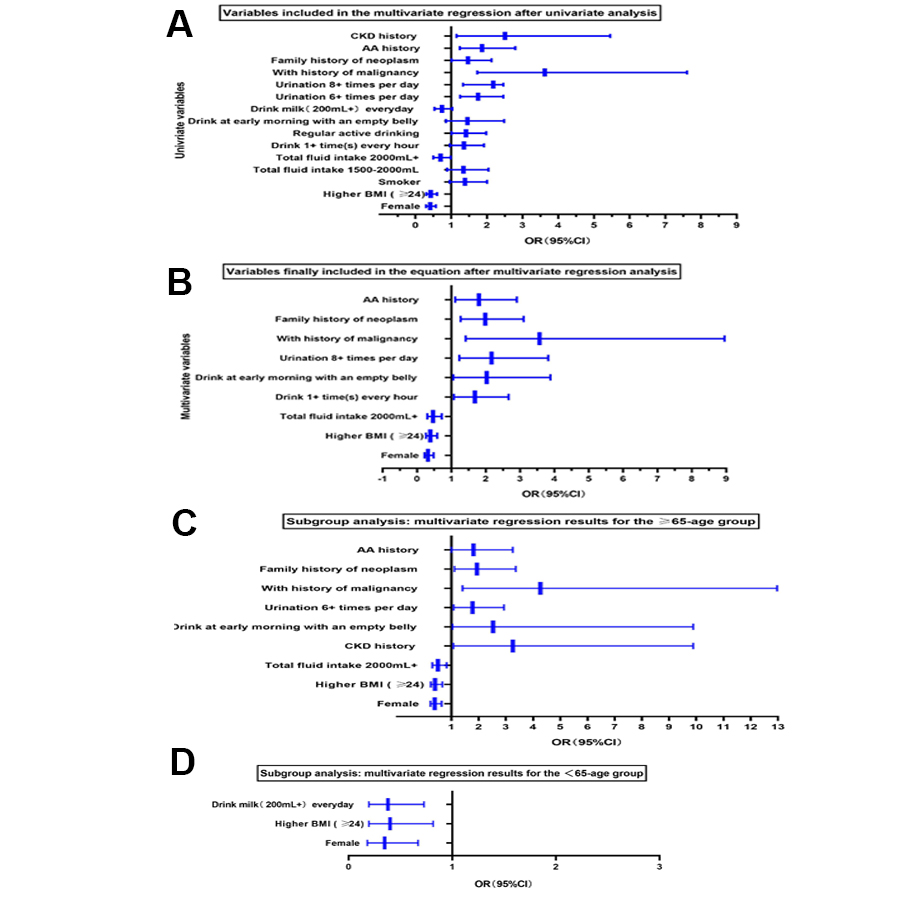Back
Poster, Podium & Video Sessions
Moderated Poster
MP40: Bladder Cancer: Upper Tract Transitional Cell Carcinoma I
MP40-15: Association Between Daily Behavioral Habits of Fluid-intaking and Urination and the risk of Upper Tract Urothelial Carcinoma: A Case-control Study
Sunday, May 15, 2022
8:45 AM – 10:00 AM
Location: Room 225
Chunru Xu*, Zhihua Li, Ying Liu, Hua Guan, Xinyan Che, Meng Zhang, Yanbo Huang, Liqun Zhou, Xuesong Li, Chunde Li, Beijing, China, People's Republic of
- CX
Poster Presenter(s)
Introduction: Due to the lack of existing literature and evidence, this study was to investigate the association between daily drinking habits and urination behavior and the risk of upper tract urothelial carcinoma.
Methods: The study was designed as a case-control trial. Patients who admitted to our hospital from 2020-08 to 2021-08 was recruited. The case group was composed of patients with UTUC, and the control group was composed of non-oncology patients like the ones admitted for trauma. Each included patient completed a questionnaire consisting of dichotomous and numerical questions. The variables which showed relatively significant difference (p < 0.2) after univariate analysis were selected for inclusion in a binary logistic regression for multivariate analysis.
Results: A sum of 267 UTUC patients and 318 control cases were included in this study. Patients with female gender, higher BMI (=24), daily total fluid intake >2000mL(OR = 0.467, 95%CI:0.300-0.728) have a lower risk of UTUC. Patients who drank water/beverages in the early morning with an empty belly (OR = 2.051, 95%CI: 1.047-3.915), drank water/beverages at least once every hour (OR = 1.678,95%CI:1.061-2.653), pee =8 times per day (OR = 1.781, 95%CI: 1.195-2.654), and with the history of malignancy, family history of malignancy and aristolochic acid exposure seem to have a higher risk (Fig. A&B). These exposures seem to have more significant effects for the elder patients (=65 years old). Especially, CKD history (OR = 3.256, 95%CI:1.072-9.886) and =6 urinations per day (OR = 1.780 ,95%CI:1.081-2.930) also showed a positive association with UTUC (Fig. C). No included factors added risk of UTUC to the patients whose age < 65, only female gender, higher BMI (=24), and daily milk consumption =200mL (OR = 0.378, 95%CI:0.196-0.727) showed negative correlation with the UTUC (Fig. D).
Conclusions: Appropriate increases in total fluid intake, adjustments in the timing and frequency of fluid intake, and fixation in urinary frequency symptoms may reduce the risk of UTUC. These findings are perhaps even more applicable to elder patients (=65 years old). But the mechanisms still need to be verified by further experiments.
Source of Funding: This study was funded by Wuxi "Taihu Talents Program" Medical and Health High-level Talents Project.

Methods: The study was designed as a case-control trial. Patients who admitted to our hospital from 2020-08 to 2021-08 was recruited. The case group was composed of patients with UTUC, and the control group was composed of non-oncology patients like the ones admitted for trauma. Each included patient completed a questionnaire consisting of dichotomous and numerical questions. The variables which showed relatively significant difference (p < 0.2) after univariate analysis were selected for inclusion in a binary logistic regression for multivariate analysis.
Results: A sum of 267 UTUC patients and 318 control cases were included in this study. Patients with female gender, higher BMI (=24), daily total fluid intake >2000mL(OR = 0.467, 95%CI:0.300-0.728) have a lower risk of UTUC. Patients who drank water/beverages in the early morning with an empty belly (OR = 2.051, 95%CI: 1.047-3.915), drank water/beverages at least once every hour (OR = 1.678,95%CI:1.061-2.653), pee =8 times per day (OR = 1.781, 95%CI: 1.195-2.654), and with the history of malignancy, family history of malignancy and aristolochic acid exposure seem to have a higher risk (Fig. A&B). These exposures seem to have more significant effects for the elder patients (=65 years old). Especially, CKD history (OR = 3.256, 95%CI:1.072-9.886) and =6 urinations per day (OR = 1.780 ,95%CI:1.081-2.930) also showed a positive association with UTUC (Fig. C). No included factors added risk of UTUC to the patients whose age < 65, only female gender, higher BMI (=24), and daily milk consumption =200mL (OR = 0.378, 95%CI:0.196-0.727) showed negative correlation with the UTUC (Fig. D).
Conclusions: Appropriate increases in total fluid intake, adjustments in the timing and frequency of fluid intake, and fixation in urinary frequency symptoms may reduce the risk of UTUC. These findings are perhaps even more applicable to elder patients (=65 years old). But the mechanisms still need to be verified by further experiments.
Source of Funding: This study was funded by Wuxi "Taihu Talents Program" Medical and Health High-level Talents Project.


.jpg)
.jpg)